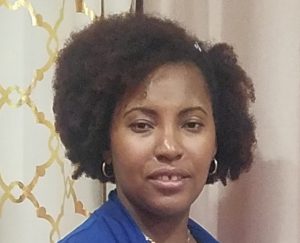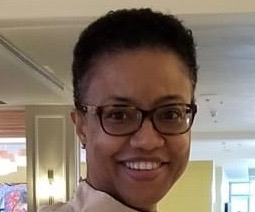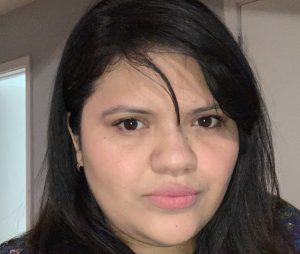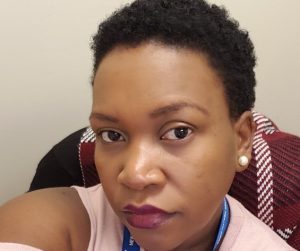Spotlight On…Community Mental Health Services Social Workers!
 Marisol Alcantara — CMHS Mobile Crisis Team, Queens Region
Marisol Alcantara — CMHS Mobile Crisis Team, Queens Region
The thing that attracted me to the Mobile Crisis team was the immediacy of the field work. We see as many as six or seven patients a day, usually within 24 hours after the referral comes in. As soon as a team is available we make a home visit—social workers, mental health counselors, and nurse practitioners go to the home and meet with the client. We are always in a state where you don’t know what you’re going to see when you get there. You have to be aware of your surroundings—there can be things you don’t expect. The cases almost all are mental-health-related, including depression, psychotic disorders, bipolar, anxiety, and substance use.
We assess the immediate problem and gain an understanding of what care the patient needs, and also determine and address any safety issues. When we assess the client, we are the eyes and ears for whoever referred them. It’s very rewarding when you meet with a client and listen and understand their problems, determine the services they should be connected to and, in a very short period of time, engage with them and build a rapport. You learn every day about human nature and how to help people. It’s a great experience.
 Georgiana Cemento — Program Coordinator, CMHS Brooklyn Health Home
Georgiana Cemento — Program Coordinator, CMHS Brooklyn Health Home
Our Health Home provides in-home, goal-driven care for people diagnosed and living with severe, long-term mental illness (which accounts for about 90 percent of our patients) or two coincident chronic medical conditions. Services we provide include anything from connecting clients to doctors who can manage their medication regimens to helping a diabetic with poor dietary habits learn to cook. We monitor the individuals in our program several times each week to keep them on a path where they can remain comfortable, safe, and independent in their homes. We celebrate even the smallest progress, but some clients achieve big things—like months or years without hospitalizations, or even returning to school. When they understand the benefits of reaching their goals—going to the doctor, eating healthy—we are doing something important in their lives.
I have seven bachelor’s-level staff members with a variety of backgrounds who work in the field as care managers, developing service goals to be achieved together with their clients. I work in the office with administrative and supervisory tasks, but I do miss providing direct care, so I sometimes cover one or two cases for other staff. In my experience, practicing social work has provided me with a rewarding and challenging opportunity to see people overcome their barriers. Helping others has allowed me to grow and develop several skills that I never thought I would have. I also love the team I work with. Their combined skills make them an awesome team. They are reliable, respect each other, and share the same vision and dedication. It’s a very difficult job, and I commend each of them for the hard work they do and their commitment and care for their clients. If you’re thinking of becoming a social worker, you have to care deeply and want to see people living a better life of dignity and worth. We start from there, and everything else falls into place.
 Karen Inestroza — CMHS Psychiatric Social Worker and Supervisor, FRIENDS Promise Zone
Karen Inestroza — CMHS Psychiatric Social Worker and Supervisor, FRIENDS Promise Zone
Our Promise Zone team is based on-site in nine public elementary schools in the Bronx. We make sure mental health care is available to at-risk students. When kids show oppositional behavior or have disruptive anger outbursts, we refer them for neurologic and psychological evaluation and other services, and work with their schools and their parents to help stabilize and secure their homes. One of our primary roles is to educate school leadership and staff to recognize the mental health issues these students face—to understand that these are illnesses and the kids are not intentionally disruptive—and to appreciate that they may have different ways of learning. That’s the key to keeping the kids in school and creating an environment conducive to learning.
I supervise five staff members—three social workers and two family advocates—who are incredible. They are proactive and committed and would do anything for the kids. We are the children’s advocates and their voice in a way. Our main goal is to remove the stigma of mental health so the kids can progress in school and function socially. If your child has a physical illness, you give them medical treatment. It’s the same thing with mental illnesses. I feel so fortunate to work at VNSNY, which is like a second home to me, and to have the chance to bring social justice to children in need.
 Marion Spencer — Program Manager, CMHS Manhattan Shelter Assertive Community Treatment (ACT) Team.
Marion Spencer — Program Manager, CMHS Manhattan Shelter Assertive Community Treatment (ACT) Team.
In ACT, it’s not just you working on a case—it’s multiple people giving input. I lead a team of seven, including a psychiatrist, full- and part-time registered nurses, a drug counselor, a peer specialist, a housing specialist and a vocational specialist. Our team cares for 50 adult patients in four state-run ACT homeless shelters in Manhattan. Some of these patients are struggling with severe illnesses like schizophrenia or bipolar disorder. We assess them, create a treatment plan, and monitor them. We try to see each patient at least twice each week, and more frequently if needed.
Our biggest challenges are finding acceptable housing for patients and making sure they stay compliant with their treatment plan. Many of our patients are working towards life-changing goals like getting a job. But there are also significant smaller achievements, like when a patient has grown in self-knowledge to where they can reason their way through a crisis. There’s an expression I learned as a child in Jamaica: ‘If you are not dead, you are still alive.’ I feel grateful when I can help a patient feel there is still hope for them to improve their health and their life—hope for recovery after a mental break, or being able to see it’s not the end of the world after they’ve been diagnosed with a mental illness. That’s my reward.
To view more profiles celebrating VNSNY Social Workers, click here.